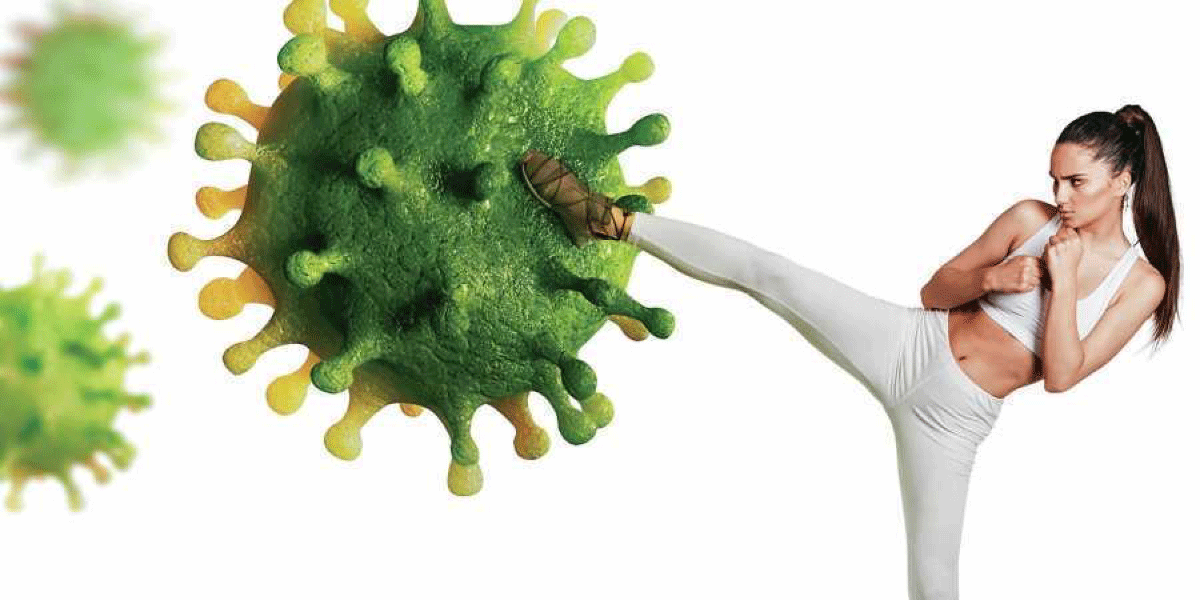
Physical Activity and its importance for body immunity

The world has metamorphosed into a battlefield with two invisible warriors fighting with their arsenals. Wondering who they are? The Hero – our immune system and the Villain – the coronavirus. We want the hero to win in every episode. The solution for supporting the hero with minimal effort is “Physical Activity”.
The importance of ‘Physical Activity’ is often understated. Especially in times such as these, the immunity of an individual should be the best. However, due to the pandemic, you are caught in the cobweb of a sedentary lifestyle. Are you stuck in mental conflict? Should you be exercising during these uncertain times? Yes, you should.

The world has metamorphosed into a battlefield with two invisible warriors fighting with their arsenals. Wondering who they are? The Hero – our immune system and the Villain – the coronavirus. We want the hero to win in every episode. The solution for supporting the hero with minimal effort is “Physical Activity”.
The importance of ‘Physical Activity’ is often understated. Especially in times such as these, the immunity of an individual should be the best. However, due to the pandemic, you are caught in the cobweb of a sedentary lifestyle. Are you stuck in mental conflict? Should you be exercising during these uncertain times? Yes, you should.
“Practice of physical activities strengthens the immune system”.
Working out significantly alters the immune system and improves the quality of life. Exercising causes the antibodies or WBCs to circulate rapidly. It can act in the immune response, reduce the risk of developing systemic inflammation, and aid in stimulating cellular immunity.
How much should you exercise?
150 min per week for adults and 300 min per week for kids and adolescents. Various studies say that the modulation of the immune response is related to exercise and depends on factors such as regularity, intensity, duration, and type of effort applied. Moderate levels of exercise bolster the efficacy of the immune system in fighting pathogens. However, exhaustive levels of exercise may actually tank the cellular immunity and snowball the risk of catching infections.
“Practice of physical activities strengthens the immune system”.
Working out significantly alters the immune system and improves the quality of life. Exercising causes the antibodies or WBCs to circulate rapidly. It can act in the immune response, reduce the risk of developing systemic inflammation, and aid in stimulating cellular immunity.
How much should you exercise?
150 min per week for adults and 300 min per week for kids and adolescents. Various studies say that the modulation of the immune response is related to exercise and depends on factors such as regularity, intensity, duration, and type of effort applied. Moderate levels of exercise bolster the efficacy of the immune system in fighting pathogens. However, exhaustive levels of exercise may actually tank the cellular immunity and snowball the risk of catching infections.

– Aerobic exercise helps you to keep your heart, lungs, and circulatory system healthy. Various aerobic activities that you can partake in include walking, dancing, cycling, swimming, etc.
– Brisk walking is ideal too. However, 100 steps per minute are the standardmeasure and the speed that needs to be maintained is 5km/hr.
– Cycling exercises most of the muscles in the lower body as well as your heart and lungs. Leisure cycling burns about 150 calories in 30 minutes. You aren’t on a race track to compete against someone. A speed of less than 16 km/hr is regarded appropriate to cycle leisurely.
– Tennis is a naturally socially distanced sport and helps in improving lung
capacity. Playing double tennis gives a moderate level of physical exercise. You can safely play a game with your squad and keep your spirits up.
– Line dancing is the best form of exercise for ageing bodies. It doesn’t seem like an exercise but helps you burn calories quickly and is a great cardio workout.
– Aerobic exercise helps you to keep your heart, lungs, and circulatory system healthy. Various aerobic activities that you can partake in include walking, dancing, cycling, swimming, etc.
– Brisk walking is ideal too. However, 100 steps per minute are the standardmeasure and the speed that needs to be maintained is 5km/hr.
– Cycling exercises most of the muscles in the lower body as well as your heart and lungs. Leisure cycling burns about 150 calories in 30 minutes. You aren’t on a race track to compete against someone. A speed of less than 16 km/hr is regarded appropriate to cycle leisurely.
– Tennis is a naturally socially distanced sport and helps in improving lung
capacity. Playing double tennis gives a moderate level of physical exercise. You can safely play a game with your squad and keep your spirits up.
– Line dancing is the best form of exercise for ageing bodies. It doesn’t seem like an exercise but helps you burn calories quickly and is a great cardio workout.
Regardless of age, regular exercise should be performed by everyone to improve the functioning of the immune system. Moreover, exercise releases happy hormones like endorphins and dopamine to relieve stress and anxiety.
Regardless of age, regular exercise should be performed by everyone to improve the functioning of the immune system. Moreover, exercise releases happy hormones like endorphins and dopamine to relieve stress and anxiety.

Now, push the right buttons on our Actiwoo app and change your life. Let the pandemic not leave you out of shape and affect your immunity. You want to be as fit as a fiddle and let your Hero “The Immune System” emerge victoriously.
Now, push the right buttons on our Actiwoo app and change your life. Let the pandemic not leave you out of shape and affect your immunity. You want to be as fit as a fiddle and let your Hero “The Immune System” emerge victoriously.




